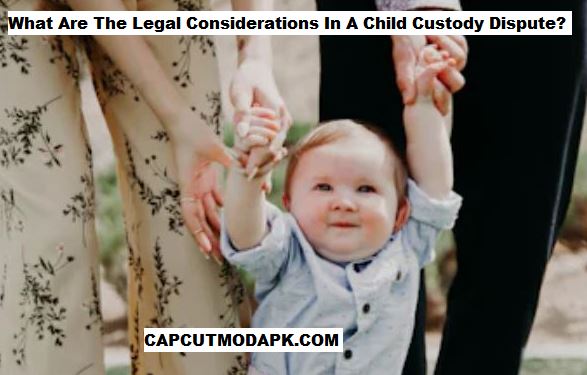Child custody disputes can be emotionally and legally complicated. Whether you’re seeking custody of your child or involved in a battle over visitation rights, understanding the legal landscape is essential. What are the legal considerations in a child custody dispute? It’s not just about fighting for your child’s time but ensuring their best interests are prioritized, which is the foundation of any custody case.
Courts focus on what will provide the most stable and nurturing environment for the child. In child custody cases, the legal process is guided by the principle of “best interest of the child,” which may vary depending on the jurisdiction. There are numerous factors at play, from the child’s relationship with each parent to the ability of each parent to provide for the child’s needs. Whether you’re involved in a custody case or simply want to know more about child custody laws, knowing what the courts consider is critical.
In this article, we’ll explore what are the legal considerations in a child custody dispute, including the most important things to know when preparing for a custody case. We’ll also discuss strategies for handling a custody dispute, the best types of evidence to present, and the common mistakes to avoid during a custody battle. Understanding these considerations can help ensure a fair process and guide you through the emotional and legal complexities of custody disputes.
What Not To Say In A Custody Battle?
One of the most important factors in a child custody case is how you present yourself in court. The things you say can significantly affect the outcome of the case. What are the legal considerations in a child custody dispute when it comes to your statements? Anything you say about the other parent can be used against you, so it’s crucial to keep emotions in check and avoid saying things that could harm your case.
First, avoid speaking negatively about the other parent, no matter how you feel about them. Badmouthing your ex-partner, especially in front of your child or in front of others who might testify, can give the impression that you are unwilling to cooperate. Courts prioritize the child’s ability to maintain a relationship with both parents, so undermining the other parent may be seen as detrimental to the child’s well-being.
Second, never make exaggerated claims. Saying things like “I’m the better parent because I’m more stable” without providing proof can make your arguments seem less credible. Courts focus on tangible evidence and facts rather than emotional arguments or hyperbole. Lastly, avoid bringing up irrelevant issues, such as the other parent’s past relationships or non-custodial matters that don’t affect the child’s well-being. Stick to the key points that demonstrate your ability to care for the child. Also, READ
How To Protect Your Assets With A Prenuptial Agreement
How Do I File For Divorce And What Legal Documents Do I Need?
Who Are The Best Witnesses For A Custody Case?
Witnesses can play a pivotal role in a child custody case. What are the legal considerations in a child custody dispute regarding witnesses? The best witnesses in custody cases are those who can offer concrete evidence that supports your position and the child’s best interests.
Start with individuals who have witnessed your involvement in your child’s life. This can include teachers, daycare providers, doctors, or family friends who have observed your parenting abilities. They can testify about your relationship with the child, your ability to care for them, and your involvement in their daily activities. Witnesses with direct knowledge of your parenting style and your child’s needs can provide valuable insights.
Next, consider professionals like social workers or therapists who may have worked with your child or the family as a whole. They can offer an unbiased perspective on the family dynamics, which can be extremely useful to the court. A therapist or counselor who has worked with the child may provide expert testimony on how the custody arrangement may affect the child’s emotional health. These types of professional witnesses can be highly influential in child custody disputes.
How To Deal With A Custody Dispute?
Dealing with a custody dispute can feel overwhelming, especially when emotions are running high. However, understanding what are the legal considerations in a child custody dispute can help you stay grounded. The first step is to focus on your child’s needs and best interests. Although it may be difficult, it is crucial to keep the child’s well-being at the forefront of every decision.
One important way to manage a custody dispute is to keep communication with the other parent as calm and respectful as possible. Conflict and hostility may escalate the situation, making it harder to find an amicable solution. Try to work through mediation or negotiation to come to an agreement outside of court. Many courts require mediation as part of the custody process because it often leads to better outcomes for both parents and children.
If you must go to court, be prepared. Gather all the necessary documents, including records of your involvement in the child’s life, any evidence of the other parent’s behavior that could be harmful, and relevant communication between both parties. Presenting yourself as cooperative and responsible will show the court that you are focused on the child’s best interests rather than on personal grievances with the other parent. The goal should always be to demonstrate that you are committed to providing a stable and supportive environment for your child.
What Is The Most Important Consideration In The Issue Of Child Custody?

The most important factor in a child custody case is always the best interest of the child. Courts use this principle to make decisions about custody, visitation, and child support. But what exactly does the “best interest” of the child mean? It involves various factors, including the child’s emotional, physical, and educational needs.
The court will look at each parent’s ability to meet these needs, such as their financial stability, mental and physical health, and overall lifestyle. The child’s relationship with each parent is also a crucial factor. For example, if one parent has been the primary caregiver and has a strong bond with the child, that may play a significant role in the court’s decision. Additionally, the child’s age and preference may also be considered, especially if the child is old enough to express a clear preference.
The goal is always to ensure that the child’s well-being and stability are prioritized above all else. This means that the court may also consider the living environment of each parent, the involvement of extended family members, and the child’s current routine. When considering what are the legal considerations in a child custody dispute, it’s important to understand that the child’s best interests are the guiding principle that drives all decisions.
What Is The Biggest Mistake In Custody Battle?
One of the biggest mistakes people make in custody battles is losing focus on the child’s needs and focusing solely on their personal desire for custody. What are the legal considerations in a child custody dispute in this regard? Courts are not interested in which parent “wins” or gets more time with the child. Instead, they are focused on what will provide the most stable and supportive environment for the child’s development.
A common error is assuming that being the primary caregiver or being the more emotionally attached parent automatically guarantees custody. While this is important, courts also look at the practicality of who can best meet the child’s emotional, physical, and financial needs. For instance, if one parent is unable to provide a stable home or has a history of substance abuse, these factors can significantly impact the outcome of the case. Even if one parent has been more involved, they may not be the best option for custody if they are unable to offer a stable environment.
Additionally, one of the biggest mistakes is failing to present solid evidence that supports your claims. Emotional testimony alone won’t win a case; you need facts, records, and credible witnesses. Failure to organize and present your evidence clearly can weaken your case and hurt your chances of a favorable ruling.
What Is The Best Evidence For Child Custody?
The best evidence for a child custody case includes both factual documentation and witness testimony. What are the legal considerations in a child custody dispute when it comes to evidence? Courts require objective evidence to support claims made by either parent. This includes school records, medical records, communication logs (emails, texts, etc.), and financial documents that show the ability of each parent to care for the child.
Other key evidence includes records of your involvement in the child’s life. This might include records of attending parent-teacher conferences, extracurricular activities, and medical appointments. If one parent is seeking full custody, showing that you have been an active participant in the child’s life will strengthen your case. Additionally, any evidence of neglect, abuse, or substance use by the other parent can be highly relevant.
Witness testimony is also crucial. This could include teachers, daycare workers, family friends, or neighbors who can speak to your parenting abilities and the child’s relationship with you. Having a solid mix of documentary evidence and witness testimony gives you a strong foundation for your case.
Conclusion
Child custody disputes are complex, and understanding what are the legal considerations in a child custody dispute is crucial to navigating the process successfully. From focusing on the best interests of the child to presenting solid evidence and avoiding personal conflicts, each step plays a significant role in the outcome of your case. By focusing on the child’s well-being, gathering the right evidence, and avoiding common mistakes, you can better prepare yourself for the challenges of a custody battle and increase your chances of securing a favorable outcome.


